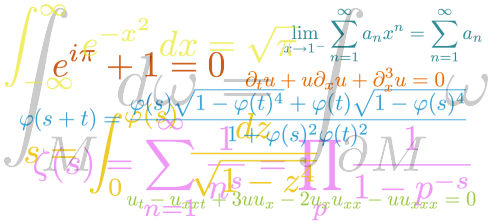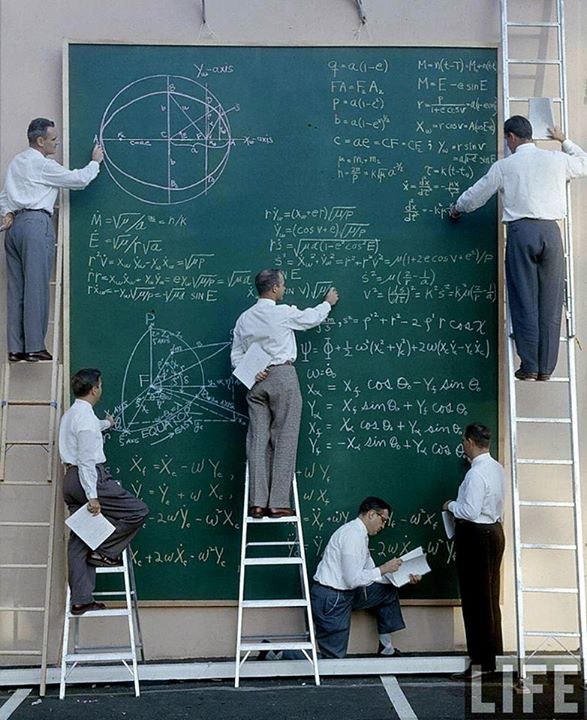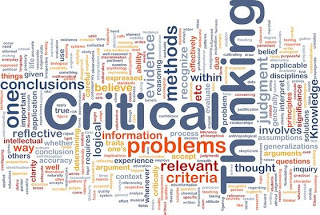Resources for Math Majors
This page contains resources for undergraduate Math Majors. Here is a list of the topics covered.

- Study Tips for Advanced Math Courses
- Professional Societies
- Undergraduate Research Projects and Other Programs
- Advice Regarding Extracurricular Opportunities
- Resources for Math Majors Considering Graduate School
- Career Resources
- Interesting and Fun Math Links
1. Study Tips for Advanced Math Courses
As you proceed in your mathematical education, you will find upper level math courses to be quite
a bit different from lower level math courses. (In fact, many math majors do not get a really good
understanding of what mathematics is until their junior or senior year of undergraduate
studies.) Upper level math
courses have greater emphasis on conceptual understanding, abstraction, and the ability to
modify known results to deal with new situations.
 TRANSITIONING TO ADVANCED COURSES. There are different expectations in upper level courses: You will be expected to
read your textbook and do more of the work on your own; you will be expected to write proofs
and communicate mathematical ideas and arguments; more time will be spent on conceptual understanding
and less time will be spent on computation.
TRANSITIONING TO ADVANCED COURSES. There are different expectations in upper level courses: You will be expected to
read your textbook and do more of the work on your own; you will be expected to write proofs
and communicate mathematical ideas and arguments; more time will be spent on conceptual understanding
and less time will be spent on computation.
You will start to see these differences a bit in sophomore-level courses (such as a Linear
Algebra class or an Introduction to Proofs class), and the differences will be even
more pronounced in higher-level courses, where typically much greater emphasis is placed on
understanding theorems and writing proofs.
Here are some guides I have written for students making the transition to advanced math courses.
STUDYING ALONE VS. STUDYING IN A GROUP. Research by Uri Treisman at the University of California at Berkeley
suggests that students can improve their performance in mathematics classes if they study in groups with group work being a
complement to (not a replacement of) individual study. Group work also has the advantage of promoting a blurring of the
distinctions between the academic and social spheres of students' lives.
With this in mind, if you want group work to be helpful, you should collaborate with other students
in addition to the standard "3 hours of individual studying for each 1 hour in class". If you study
with a group in addition to your individual study, it will improve your performance and knowledge of the material.
But if you work in groups at the cost of working less on your own, it can hurt your performance.
It is a good idea in each of your courses to form a study group with two to five other students.
Get the email address or phone number of the students in your study group. Even if you do not spend much time working
with them, they are a useful resource for asking questions or to find out what was missed (and get notes)
if absent from a day or two of class.
STUDYING ALL NIGHT. The following is from p.20 of the August 8, 1994 issue of Time magazine:
"Students who think nothing of pulling all-nighters, take note: experiments with both rats and humans have
convinced researchers that people who get plenty of sleep are better at learning things. The brain evidently uses its
rest periods to consolidate new memories."
Pulling all-nighters to study for finals or other exams, or to complete homework sets or take-home exams,
is largely ineffective. The price you pay by losing sleep, and the reduced performance due to exhaustion, far
outweigh the benefit of the extra hours of studying. Worse than that, the material you cover during your all-night
binge often does not get placed properly into your long-term memory, so you forget it very quickly. This
means that if you need the material for subsequent courses or in your future career, pulling an all-nighter is not going to provide
you with what you need to know. All-nighters cheat you
out of the opportunity to master the material and make it part of your permanent skill set.
PACING YOURSELF. Mathematics is not suitable for cramming. Read the appropriate sections prior to class, take notes during lecture,
review your notes and the textbook shortly after the lecture, and begin the assigned problems while the material is fresh in your mind.
Do the homework regularly and do a few problems every day; do not do all the problems at
once. If you get behind in the homework, doing a bunch of problem sets all at once is often not useful, just as it would not be useful to
miss your workouts for a month and then try to train for a 10K run all in one day, or miss your piano lessons for a month
and then try to cram for a recital by practicing for hours the day before. When it
comes to mathematics homework, you want to work regularly and consistently, much as you do when training for a physical event
or learning to play a musical instrument. Your mind needs time to get used to the new ways of thinking and to
build mental structures for organizing the material. In fact, research in neuroplasticity has shown that
learning certain new skills (including mathematics) actually changes
the physical structure of your brain by creating new neural pathways. This kind of change does not occur all at once,
and requires repeated practice to develop. Just as building muscle requires regular and consistent physical workouts, building your
brain requires regular and consistent mental workouts. Continuing the analogy further: If you don't do enough exercises at one time,
it will not add up to a cumulative benefit; and if you do too much at once, you risk fatigue or strain. You need to practice
regularly and consistently, at a level where you push but do not strain yourself.
OFFICE HOURS. Make use of your professor's Office Hours. You will find that you get
the most out of office hours if your have read the book, attempted the problems, and
thought about the material on your own before asking the professor. Come prepared and ask specific questions. For more details,
see my advice on office hours for undergraduates.
THE IMPORTANCE OF READING YOUR TEXTBOOK. As you continue in your mathematics
education, it becomes increasingly important that you engage with your textbook as you
study and learn. Not all relevant material will be covered in class, and textbooks
can provide additional opportunities for motivation, examples, and details beyond what you will
encounter in lecture. Furthermore, in upper-level math classes it is a good idea to
use additional books to supplement the textbook used in the class, so that you can
see multiple perspectives on the subject and be exposed to additional topics
that may not be covered in your own text. Finally, it is likely that you will
want to learn topics that you have not have a class on, and it is useful to use a
handful of texts on the
subject to do this. The following are some suggestions for textbooks on particular topics.
Textbook Recommendations for Self Study
2. Professional Societies
 There are several professional societies for mathematicians. The two main professional societies are the following:
There are several professional societies for mathematicians. The two main professional societies are the following:
- The American Mathematical Society (AMS) is dedicated to the
interests of mathematical research and scholarship, and serves the national and international
community through its publications, meetings, advocacy and other programs.
- The Mathematical Association of America (MAA) works to
advance the mathematical sciences, especially at the collegiate level, through education, research,
professional development, public policy, and public appreciation of mathematics.
Sometimes the differences between the AMS and MAA are summarized as "The MAA is more concerned with mathematics education,
while the AMS is aimed more at professional mathematicians". While there is some
truth in this, it is a crude oversimplification of the much more subtle differences that exist. The
AMS and MAA are both interested in mathematics education at all levels as well as research mathematics, but their missions place
different emphasis on various issues within education and research.
As a mathematics student, you should consider joining both the AMS and MAA. Membership information
can be found on each society's website, and
you should be aware that the student rates for membership are much cheaper than rates for
faculty. As a member of a professional society, you
receive the monthly publications of the society, discounts on books and conference
registrations through that society, mathematics and society news,
information about mathematics opportunities, and access to certain online information.
Your membership also supports the mathematics community and
shows a level of professionalism that future employers and graduate programs like to see.
In addition to the AMS and MAA, there are other popular professional
societies in mathematics with more specialized roles:
- The Society for Industrial and Applied Mathematics (SIAM) exists to ensure the strongest
interactions between mathematics and other scientific and technological communities.
- The Association for Women in Mathematics (AWM) encourages
women and girls to study and to have active careers in the mathematical sciences, and promotes equal
opportunity and the equal treatment of women and girls in the mathematical sciences.
- The American Statistical Association (ASA) is the nation's leading professional
association for statistics. Also see their
Student
Resource Page.
- The Society of Actuaries (SOA) is an educational, research, and professional
organization dedicated to serving the public and Society members. The SOA's vision
is for actuaries to be the leading professionals in the measurement and management of risk.
- The American Academy of Actuaries (AAA)
The American Academy of Actuaries is a professional association whose mission is to serve
the public and the U.S. actuarial profession. Academy members include consultants,
corporate executives and staff, regulators, government officials, academicians,
and retired actuaries. Their areas of practice cover pensions, life insurance, casualty
insurance, health insurance, financial reporting, risk management, and more.
Even if you are not a member of a particular society, their website can often be a source of very useful
information for you. In particular, the AMS and MAA both have a list of resources or undergraduate
mathematics majors on on their websites, and these are accessible to everyone.
3. Undergraduate Research Projects and Other Programs for Math Majors
 An important way to enhance your undergraduate mathematics education is through participation
in an undergraduate research project or long-term mathematics program at another university.
An important way to enhance your undergraduate mathematics education is through participation
in an undergraduate research project or long-term mathematics program at another university.
If you are interested in doing an Undergraduate Research Project with a professor in
your own department, please see the following page for advice:
If you are interested in doing an Undergraduate Research Project at another university or
participating in some other kind of Mathematics Program, see the following pages.
4. Advice Regarding Extracurricular Opportunities
 Every undergraduate should be involved in some kind of extracurricular activity related to their major.
Every undergraduate should be involved in some kind of extracurricular activity related to their major.
Extracurricular activities often provide great experiences for students involved in them.
They give you the chance to learn more about your profession, gain experience for your future career, and
learn about aspects of your major that you do not see in the classroom. They also provide wonderful networking
opportunities and chances to develop collaboration or leadership skills.
On top of all these wonderful reasons, there is also a more practical aspect to being involved in extracurricular activities.
A college degree is not a ticket to a career. The fact of the matter is that if you graduate and your resume says nothing but
B.A. or B.S. in your field of study without a single additional activity relevant to your career path,
then its unlikely you will get a job or get accepted to graduate school. A degree is considered a baseline requirement for most careers ---
it is one necessary part, but it is not sufficient by itself.
In a competitive job market, with lots of people
coming out of college with degrees in your subject, you need additional activities, involvements, and experiences to make yourself marketable.
You need to do something
to distinguish yourself. You need to show an interest in your field and a commitment to it that displays more than
just satisfying the minimum requirements. If you don't do these additional things, there are plenty of other people out there who are,
and you will probably be passed over in favor of them. In fact, when you see individuals who graduate from college with a
degree, perhaps even with a good GPA to go with it, but are now unemployed
or working a minimum wage job, it is often the case that they did nothing beyond the basics in earning their degree. Employers and
graduate schools are interested in individuals who are active, accomplished, and passionate. One way to communicate
these qualities is through your choice of extracurricular activities.
Every Math Major should be involved in some kind of activity beyond just their coursework.
Possible activities include being involved in your depart's undergraduate math club,
attending talks at a department colloquium, serving as a mathematics tutor at your
school's tutoring center, and joining professional
societies such as the AMS and MAA. Furthermore, every Math Major (and especially
those planning on graduate school) should give some serious consideration to being
involved in an Undergraduate
Research Project and participating in at least
one Mathematics Program outside of their own college or university.
5. Resources for Math Majors Considering Graduate School
 The AMS and MAA maintains a lists of links to resources for students considering graduate school in Mathematics.
The AMS and MAA maintains a lists of links to resources for students considering graduate school in Mathematics.
Deciding if You Want to Go to Graduate School
Here is some information to learn more about what graduate school entails and help you
decide if it is for you.
Some useful information to know:
- Unlike your undergraduate studies, graduate school in mathematics (as well as in most
sciences) is typically free if you are pursuing a Ph.D. If you are accepted into a Ph.D. program,
you will be offered a Teaching Assistantship (TA). In return for a certain amount of TA work
per week (involving duties such as grading, tutoring, and running recitation sections) you will have your
tuition waived and earn a small salary. Thus you will not have to take out loans, and in
return for TA work you will make enough to support yourself in a modest lfestyle. You are
usually not allowed to work an additional job besides your TA position when in graduate school. In addition,
you should be aware that if you go to graduate school you can defer your college loans,
so you do not have to pay back any undergraduate loans until after you finish graduate
school.
Preparing for Graduate School
Choosing a Graduate School
Applying to Graduate Schools
The following contain various tips on things you should do when applying to graduate school
and this article describes some things you should avoid:
Fellowships for Graduate Schools
Although you typically do not have to pay to attend a Ph.D. program in mathematics, you
may still want to apply for a graduate fellowship to fund your education. Graduate Fellowships will
pay for your education for a number of years, and hence during this time you will not
have to TA, which frees up numerous hours per week for studying and research. In fact, many of them pay
more lucratively than a TA position, so if you have one you will also have more income than you would
while working a TA position.
In addition, most graduate fellowships are highly prestigious,
and receiving one is something you can put
on your Resume/Curriculum Vitae, which will help you get a job after graduate school.
Here is a list of Graduate Fellowships.
- National Science Foundation's Graduate Research Fellowship Program (GRFP)
The National Science Foundation provides fellowships to students pursuing graduate study in mathematics or science.
These are considered the most prestigious of graduate fellowships.
- Hertz Foundation Fellowships
The Fannie and John Hertz Foundation provides unique financial and fellowship support
to the nation's most remarkable Ph.D. students in the physical, biological, and engineering sciences.
Fellowships are free of most traditional restrictions.
- The Ford Foundation Fellowship Programs
Through its Fellowship Programs, the Ford Foundation seeks to increase the diversity of
the nation's college and university faculties by increasing their ethnic and racial diversity,
to maximize the educational benefits of diversity, and to increase the number of professors who
can and will use diversity as a resource for enriching the education of all students.
- The National Defense Science and Engineering Graduate (NDSEG) Fellowships
The Department of Defense awards NDSEG Fellowships to applicants who will
pursue a doctoral degree in mathematics or science fields.
- The National Physical Science Consortium Graduate Fellowships
The National Physical Science Consortium is a partnership between government agencies and
laboratories, industry, and higher education. NPSC's goal is to increase the number of American
citizens with graduate degrees in the physical sciences and related engineering fields, emphasizing
recruitment of a diverse applicant pool.
6. Career Resources
 Math is used in so many different careers that it is difficult to provide a list covering
all the possibilities. Take a
look at the following links to get an idea of all the different
kinds of career options that are available.
Math is used in so many different careers that it is difficult to provide a list covering
all the possibilities. Take a
look at the following links to get an idea of all the different
kinds of career options that are available.
- What Math Majors Do After They Graduate is
an article by Michael Dorff, president of the Mathematical Association of America (MAA),
discussing jobs in Business, Industry, and Government that are available for math majors.
- Careers in Applied Mathematics is a brochure
published by the Society for Industrial and Applied Mathematics (SIAM) that describes
numerous jobs (outside of academia and teaching) involving mathematics. It gives a
small glimpse into the many job possibilities for math majors.
- WeUseMath.org The most common question students
ask math teachers at every level is "When will I use math?". WeUseMath.org is a nonprofit website that helps
to answer this question. This website describes the importance of mathematics and many rewarding career
opportunities available to students who study mathematics.
- Plus Magazine Plus is a British internet magazine that aims to introduce readers to the beauty and the
practical applications of mathematics. A lot of people don't have a very clear idea what "real" mathematics consists of, and often they don't realize how many things
they take for granted only work because of a generous helping of it. Plus provides articles and podcasts on many aspects of mathematics, covering topics as diverse as
art, medicine, cosmology and sports, current events, reviews of popular math books, and puzzles for you to sharpen your wits. They also have a regular
interview with someone in a math-related career, showing the wide range of uses of mathematics in the real world.
- Careers in Mathematics. The Mathematical Association of America has a list of some of the general categories for that
jobs involving mathematics.
- Career Profiles. At this site, you can click on the links at the left of the
page to read profiles of individuals in various careers describing how they use their mathematics degrees in their work.
- What do Mathematicians do? The American Mathematical
Society maintains a page describing various ways that mathematics is used in careers.
7. Interesting and Fun Math Links

 Back
Back

 TRANSITIONING TO ADVANCED COURSES. There are different expectations in upper level courses: You will be expected to
read your textbook and do more of the work on your own; you will be expected to write proofs
and communicate mathematical ideas and arguments; more time will be spent on conceptual understanding
and less time will be spent on computation.
TRANSITIONING TO ADVANCED COURSES. There are different expectations in upper level courses: You will be expected to
read your textbook and do more of the work on your own; you will be expected to write proofs
and communicate mathematical ideas and arguments; more time will be spent on conceptual understanding
and less time will be spent on computation.
 There are several professional societies for mathematicians. The two main professional societies are the following:
There are several professional societies for mathematicians. The two main professional societies are the following:
 An important way to enhance your undergraduate mathematics education is through participation
in an undergraduate research project or long-term mathematics program at another university.
An important way to enhance your undergraduate mathematics education is through participation
in an undergraduate research project or long-term mathematics program at another university.
 Every undergraduate should be involved in some kind of extracurricular activity related to their major.
Every undergraduate should be involved in some kind of extracurricular activity related to their major.
 The AMS and MAA maintains a lists of links to resources for students considering graduate school in Mathematics.
The AMS and MAA maintains a lists of links to resources for students considering graduate school in Mathematics.
 Math is used in so many different careers that it is difficult to provide a list covering
all the possibilities. Take a
look at the following links to get an idea of all the different
kinds of career options that are available.
Math is used in so many different careers that it is difficult to provide a list covering
all the possibilities. Take a
look at the following links to get an idea of all the different
kinds of career options that are available.
